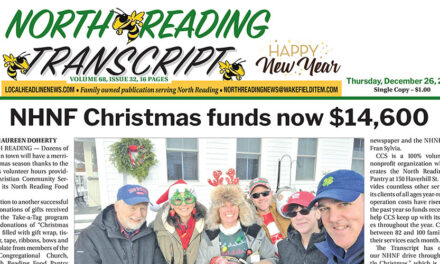Town Meeting passes plastic bag ban on voice vote; effective Jan. 1, 2020
Published June 13, 2019
By MAUREEN DOHERTY
NORTH READING — On a voice vote, after about 45 minutes of discussion, the 121 voters who participated in the annual open Town Meeting Monday night passed a ban on single-use plastic bags given to customers at retail store checkouts within the town’s borders.
As Select Board member Stephen O’Leary pointed out, the town isn’t exactly breaking new ground here. Assuming the warrant article passes muster following review by the state Attorney General in a few months, North Reading will become the 122nd community out of the 351 in the commonwealth to adopt the ban. Currently 50% of the population in the state lives in a community with a ban against the use of such bags.
The bylaw would allow retailers to offer recyclable paper bags, reusable bags or biodegradable bags at either no charge or for a fee.
If the AG’s office approves it, the ban will become part of the town’s general bylaws effective January 1, 2020 and it would be administered by the Board of Health.
The noncriminal fine structure would be a warning on first offense, $50 for second offense and $100 for third and subsequent offenses. An amendment made to the article removed the police from having anything to do with the ban; enforcement would be the responsibility of the Board of Health.
O’Leary had led the charge on the Select Board to bring this issue forward at a meeting earlier this year by requesting the Town Administrator to obtain copies of similar bans in use in other towns for the board members to review and help them craft a bylaw that would be palatable locally.
The decision to recommend passage of the bylaw was not unanimous on the board. It passed by a 3-2 vote with O’Leary, Chairwoman Kate Manupelli and new member Richard Wallner in favor of it. Voting against recommending the article for passage were Select Board member Andy Schultz and new board member Liane Gonzalez.
The voters allowed O’Leary 10 minutes leave of the meeting to explain his position on the harm plastic bags cause in the environment, after which he was given a round of applause.
“Massachusetts alone uses 2 billion (single use) bags” per year, he said. O’Leary cited the hazards of thin film plastic bags as contributing to harming wildlife, creating litter and causing suffocation in children. “Plastic bags do not biodegrade, though they do fragment through mechanical action or the presence of light,” he said, adding it is estimated that they will take between 200 and 1,000 years to break down in the environment.
The ban would not affect bags inside stores that are typically without handles, such as produce and raw meet bags.
O’Leary added that more retailers are becoming in favor of the bans, stating that the Big Y supermarket chain will voluntarily eliminate single use plastic bags in any of its stores by 2020.
Gonzalez said she views it more of an educational issue and she would prefer to educate the public on why such bags should not be used as opposed to outright banning personal behaviors.
Elizabeth Coolidge-Stolz said that as a member of the Ipswich River Watershed Association she spoke to the members who spent five hours cleaning up the North Reading stretch of the river on June 1 who said the two things that would have made their task easier would be if the public did not throw sharp objects into the river and if they did not use plastic bags. She added that when fish ingest remnants of these bags those who eat fish are ingesting microplastics.
Janet Nicosia spoke in favor of the ban, stating that her small church decided to get a free Trex bench by providing the manufacturer of plastic decking materials with 500 pounds of plastic waste in six months. They didn’t think they would be able to reach that goal but it turned out they had reached it in just three months.
Marci Bailey favored the ban as well and cited the fact that plastic bags have even been found at the bottom of the Mariana Trench at the bottom of the ocean.
Jeff Yull said there have been issues with plastics for a long time but he recalled that 50 years ago it was paper bags that were being banned because they kill trees. He objected to forcing people to do something that they can do on their own. He said the ban poses a safety issues for seniors who do not have the strength to carry heavier bags to their car.
Yull also was opposed to “75 people telling 15,000 people what to do. That’s an issue,” referencing the low turnout at Town Meeting.
But another man in the audience countered that these same 75 people had just bought a fire truck earlier in the night without a single question being raised.
In actuality, the town’s entire operating budget of over $75M passed unanimously without any debate, making it a mere footnote to the evening.
Yull suggested that this ban be brought to a town vote at the ballot as a referendum so the entire town could decide on it.
However, Town Counsel Darren Klein pointed out that would not be possible under the town’s charter as a referendum would merely be advisory; the town’s legislative body is its Town Meeting.
After the question was moved, Town Moderator John Murphy called for a vote and determined that it had carried.




